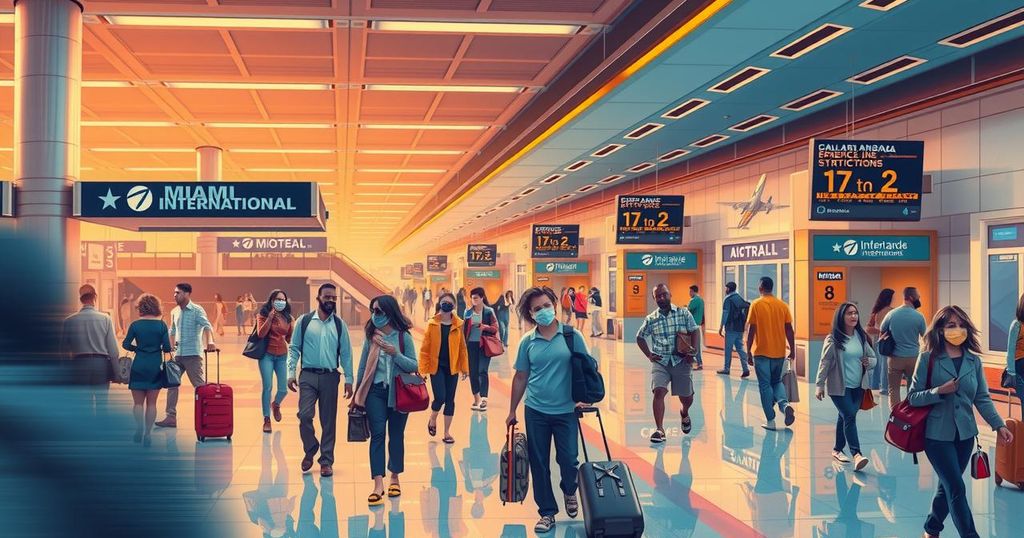Global news
CUBA, DEPARTMENT OF HOMELAND SECURITY, DONALD TRUMP, GRETHEL AGUILA, HURRICANE, HURRICANE BERYL, HURRICANE SEASON, JACQUELINE CHARLES, MIAMI, NATURAL DISASTER, NORTH AMERICA, SOUTH AMERICA, SOUTH FLORIDA, STATE DEPARTMENT, SY, TRAVEL, U. S, UNITED STATES, VENEZUELA, VERONICA EGUI BRITO, WEATHER
Fatima Khan
0 Comments
Trump Travel Ban Takes Effect, Impacting Miami and Beyond
President Trump’s new travel ban took effect this morning, restricting entry for nationals from several countries including Cuba, Venezuela, and Haiti. South Florida, home to significant populations from these nations, is bracing for impacts. Local leaders decry the ban, stressing its harmful effects on their communities, while uncertainties linger regarding how the policies will be enforced at points of entry.
The new travel restrictions imposed by President Donald Trump are now in effect, impacting nationals from various countries over national security issues. This ban, which began early this morning, raises concerns especially in South Florida, a region with a significant population of Cubans, Venezuelans, and Haitians who frequently travel or seek to enter the U.S.
Under these new guidelines, Cuban and Venezuelan nationals will face strict entry limitations, affecting tourists and family visitors, along with business travelers. Importantly, green card holders are exempt from this ban. The action also includes a full suspension of visas for immigrants and non-immigrants from countries such as Haiti.
At Miami International Airport (MIA), operations appeared normal on day one of the new travel restrictions, which especially target nationals from Cuba, Venezuela, and Haiti. The travel ban took effect at 12:01 a.m. on Monday, leading to anxiety among those holding valid U.S. visas regarding their entry status into the country.
The State Department has stated that travelers from the three affected nations with valid visas may maintain their status, although entry is ultimately determined by the Department of Homeland Security at ports of entry.
Local leaders in South Florida expressed strong opposition to this travel ban, emphasizing the potential damage it could inflict on the communities in Miami-Dade and Broward counties. These areas have large populations connected to Cuba, Haiti, and Venezuela, and leaders argue the ban undermines foundational values such as equity and compassion.
North Miami Mayor Alex Desulme articulated these sentiments, labelling the ban as a direct conflict with the values of opportunity and kindness that the nation espouses. He stressed that this policy fosters fear, tears families apart, disrupts lives, and unfairly targets communities that have been a vital part of the nation’s growth and strength.
Of note, the travel ban affects seven countries under partial restrictions, including Cuba and Venezuela, as well as Burundi, Laos, Sierra Leone, Togo, and Turkmenistan. Direct entry is barred for nationals from 12 specific nations, including Haiti, Afghanistan, and Somalia, complicating the immigration landscape further.
As for existing visas, a Department of State spokesperson clarified that while current visas will remain valid, it is the Department of Homeland Security that will ultimately determine access for their holders. This clouded decision-making further complicates the travel landscape, leaving many uncertain about their future travel plans and familial ties.
This article serves as a timely update regarding the ramifications expected from Trump’s travel ban and sheds light on issues faced by those affected within South Florida.
In brief, the Trump administration’s travel ban is now in effect, notably impacting nationals from Cuba, Venezuela, and Haiti, among others. With strong local opposition, leaders voice concerns about the emotional and economic toll this will take on communities. The ongoing uncertainty regarding who is permitted entry adds to the heavy atmosphere surrounding the policy, leaving many individuals in limbo. As the situation unfolds, it continues to raise serious questions about America’s values and humanitarian commitments.
Original Source: www.miamiherald.com




Post Comment